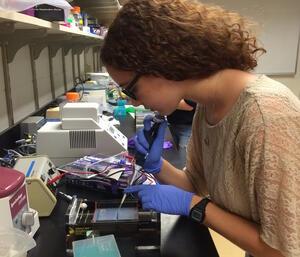Whoever Said Diamonds are a Girl’s Best Friend Never Saw a Girl Doing Science
I’ve experienced “mansplaining” many times in my life. High school boys often try to explain physics or calculus problems to me in a way that clearly implies they think I have no idea what I’m doing. Sometimes a classmate asks me a science question and almost immediately a male peer nearby says, “Don’t worry! I can explain this if she can’t!” In addition to mansplaining, jokes about feminism and subtle sexist comments occur on a daily basis at my high school, so I’ve become used to it. Sadly, even though I view myself as a strong female feminist who calls out sexism when she sees it, in many ways I’ve become numb to such prejudice. However, it stings every time I hear my male classmates voice their blatant disrespect for women, especially when it comes to women’s intelligence.
I’ve seen the worst of this type of sexism as president of a molecular biology research program at my school. In my position, I teach everything from labs to how to use research databases. It’s been relatively easy to deal with students not paying attention during lectures, but it’s become more and more challenging to see my own classmates, many of whom I previously considered friends, laugh or shake their heads when I don’t explain something perfectly.
One day, I couldn’t handle the rudeness anymore. While I was presenting, all I could focus on was a boy who was constantly shaking his head and smirking. I asked him if he wanted to come up and teach instead of me. Instead of apologizing for disrupting me, and the class as a whole, he came to the front of the room and proceeded to teach a topic I was perfectly capable of teaching myself. I froze and didn’t say anything. “Is this for real?”, I thought to myself. Besides the obvious mansplaining, race played a role in this encounter as well. My high school is 30% Asian, and the percentage is much higher in advanced science and math courses. So even though this boy’s actions were likely driven mainly by sexism, I think others in the class were more receptive to him because of stereotypes having to do with both his race, and his gender.
This scenario highlighted the doubts I have about my own intelligence; it made me feel that perhaps I can’t be just as accomplished as males in STEM fields. Nonetheless, I don’t blame this student for my self-doubt, or for the sexism at our school. I blame my school’s culture as a whole because it perpetuates the idea, especially in STEM classes, that girls are less intelligent than boys. And as I’ve already mentioned, race plays its role too.
I recognize that being a white female taking classes mainly with Asian boys affects expectations that my peers and teachers have of me. My more extroverted personality and my occasional thick, black eyeliner are not characteristics of a talented STEM student, they are trademarks of someone inconspicuous and in the lowest quartile of the class. This feeling is confirmed by my friends who have told me since the beginning of high school that the Asian boys in my classes will “crush me.”
For the past four years, I have used my friends’ negative opinions as motivation to do well in my STEM classes, not just for my own success, but to prove that the sexism and racial stereotyping inherent in my school’s culture are wrong. Intelligence is not determined by physical characteristics, personality, gender, or race. Although I have succeeded in the hardest classes my school has to offer and may have made some progress in disproving my friends’ and others’ assumptions, most of the time I don’t believe it myself. My own internalized sexism, and listening to my friends’ backhanded compliments, have led me to believe that regardless of my success, I can never be as academically accomplished as a man.
It took me all of high school to realize that because of the preconception that men hold power over women, my male peers use self-aggrandizement to prove that they are more intelligent than me. I don’t blame individual students because the need to seem greater comes from living in a patriarchal society. The boy who interrupted me was probably not thinking “oh boy, I have to knock this girl down a few pegs.” He likely wanted to demonstrate that although he wasn’t the one teaching, he still knew a lot about the topic. Looking back, I realize that what happened wasn’t about me being less intelligent than the boy; it was about the social norm of men asserting themselves over women regardless of intelligence or experience. For some reason, a majority of society believes that a man, even if he is unqualified, will explain anything and everything better than a woman. The only actions that will change this deeply ingrained social construct are those of strong, independent women (who don't need no man!) standing up for themselves in cases of mansplaining and blatant sexism.
This disdainful environment in my high school has made my job as a leader in a male-dominated academic area much more difficult, but it also taught me that I need to stand my ground, even when the odds are against me. Despite my school’s current stereotyping, I believe that the culture will change over time if women and male allies continue to speak up. As I pursue a career in a STEM field, I will continue to oppose the assumptions people make based on gender and DNA, because, just like men, women are capable of being brilliant scientists if they work hard and set their mind to it.
This piece was written as part of JWA’s Rising Voices Fellowship.








I really agree I am a radical feminist
In reply to <p>I really agree I am a by Aleksey Valentinov
you are awesome Aleksey
I agree
In reply to <p>I agree</p> by Aleksey Valentinov
I did not comment that ^